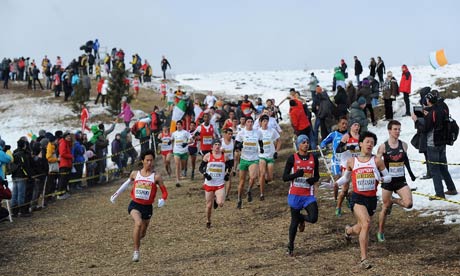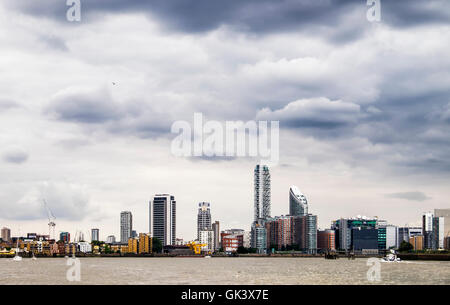From bottom to top, the black lines are the previous solar midnight, sunrise, solar noon, sunset, and the next solar midnight.
In Bydgoszcz, the chance of a wet day over the course of March is gradually increasing, starting the month at 17% and ending it at 20%.
 Lower dew points feel drier and higher dew points feel more humid. The figure below presents a compact representation of the sun's elevation (the angle of the sun above the horizon) and azimuth (its compass bearing) for every hour of every day in the reporting period. Please review our full terms contained on our Terms of Service page.
Lower dew points feel drier and higher dew points feel more humid. The figure below presents a compact representation of the sun's elevation (the angle of the sun above the horizon) and azimuth (its compass bearing) for every hour of every day in the reporting period. Please review our full terms contained on our Terms of Service page. The clearest day of the month is March 31, with clear, mostly clear, or partly cloudy conditions 42% of the time. In this report, we use a base of 50F and a cap of 86F. Definitions of the growing season vary throughout the world, but for the purposes of this report, we define it as the longest continuous period of non-freezing temperatures ( 32F) in the year (the calendar year in the Northern Hemisphere, or from July 1 until June 30 in the Southern Hemisphere).
Within 10 miles also contains only modest variations in elevation (295 feet). WeatherSpark.com. The percentage of time spent in various temperature bands. More data can be added to better personalise ads and content. The percentage of days in which various types of precipitation are observed, excluding trace quantities: rain alone, snow alone, and mixed (both rain and snow fell in the same day). For example: The figure below presents a compact representation of key lunar data for March 2022. Maps are Esri, with data from National Geographic, Esri, DeLorme, NAVTEQ, UNEP-WCMC, USGS, NASA, ESA, METI, NRCAN, GEBCO, NOAA, and iPC. The growing season in Bydgoszcz typically lasts for 5.8 months (177 days), from around April 26 to around October 19, rarely starting before April 8 or after May 17, and rarely ending before September 30 or after November 12. The transitions to and from daylight saving time are indicated by the 'DST' labels. The thin dotted lines are the corresponding average perceived temperatures. The figure below shows you a compact characterization of the hourly average temperatures for the quarter of the year centered on March. To show variation within the month and not just the monthly total, we show the rainfall accumulated over a sliding 31-day period centered around each day. Daily high temperatures increase by 10F, from 39F to 49F, rarely falling below 29F or exceeding 60F. The estimated value at Bydgoszcz is computed as the weighted average of the individual contributions from each station, with weights proportional to the inverse of the distance between Bydgoszcz and a given station. For a given day and hour of that day, the background color indicates the azimuth of the sun at that moment. This report illustrates the typical weather in Bydgoszcz, based on a statistical analysis of historical hourly weather reports and model reconstructions from January 1, 1980 to December 31, 2016. The vertical gray bars (new Moons) and blue bars (full Moons) indicate key Moon phases. The information on this site is provided as is, without any assurances as to its accuracy or suitability for any purpose. Within 50 miles contains only modest variations in elevation (686 feet). The average rainfall (solid line) accumulated over the course of a sliding 31-day period centered on the day in question, with 25th to 75th and 10th to 90th percentile bands. The number of hours during which the Sun is visible (black line). We further caution that our travel scores are only as good as the data that underpin them, that weather conditions at any given location and time are unpredictable and variable, and that the definition of the scores reflects a particular set of preferences that may not agree with those of any particular reader. The area within 2 miles of Bydgoszcz is covered by artificial surfaces (93%), within 10 miles by trees (48%) and cropland (28%), and within 50 miles by cropland (62%) and trees (28%). The average snowfall (solid line) accumulated over the course of a sliding 31-day period centered on the day in question, with 25th to 75th and 10th to 90th percentile bands. Nakusp, Canada (4,851 miles away) is the far-away foreign place with temperatures most similar to Bydgoszcz (view comparison). The average sliding 31-day snowfall during March in Bydgoszcz is gradually decreasing, starting the month at 1.3 inches, when it rarely exceeds 3.6 inches or falls below -0.0 inches, and ending the month at 0.4 inches, when it rarely exceeds 1.0 inches or falls below -0.0 inches. For each station, the records are corrected for the elevation difference between that station and Bydgoszcz according to the International Standard Atmosphere , and by the relative change present in the MERRA-2 satellite-era reanalysis between the two locations. Insights about the audience who saw the ads and content can be derived. You're permitted to use this graph as long as you provide prominent attribution with a link back close to the use of the graph. The horizontal axis is the day, the vertical axis is the hour of the day, and the colored areas indicate when the moon is above the horizon. The percentage of hours in which the mean wind direction is from each of the four cardinal wind directions, excluding hours in which the mean wind speed is less than. The average growing degree days accumulated over the course of March, with 25th to 75th and 10th to 90th percentile bands. The hourly average wind direction in Bydgoszcz throughout March is predominantly from the west, with a peak proportion of 38% on March 9.
The average daily incident shortwave solar energy in Bydgoszcz is increasing during March, rising by 1.4 kWh, from 2.1 kWh to 3.5 kWh, over the course of the month.
While having the tremendous advantages of temporal and spatial completeness, these reconstructions: (1) are based on computer models that may have model-based errors, (2) are coarsely sampled on a 50 km grid and are therefore unable to reconstruct the local variations of many microclimates, and (3) have particular difficulty with the weather in some coastal areas, especially small islands. All other weather data, including cloud cover, precipitation, wind speed and direction, and solar flux, come from NASA's MERRA-2 Modern-Era Retrospective Analysis . For reference, on January 24, the windiest day of the year, the daily average wind speed is 12.3 miles per hour, while on August 6, the calmest day of the year, the daily average wind speed is 8.7 miles per hour. We assume no responsibility for any decisions made on the basis of the content presented on this site. Meteoprog and our Service Providers may store and access personal data such as cookies, device identifiers or other similar technologies on your device and process such data to personalise content and ads, as well as provide social media features and to analyse the traffic. The wind experienced at any given location is highly dependent on local topography and other factors, and instantaneous wind speed and direction vary more widely than hourly averages. Over the course of March in Bydgoszcz, the length of the day is very rapidly increasing. For certain purposes, legitimate interests may be relied on, rather than consent. As with rainfall, we consider the snowfall accumulated over a sliding 31-day period centered around each day. The thin dotted line is the corresponding average rainfall. Land Use data comes from the Global Land Cover SHARE database , published by the Food and Agriculture Organization of the United Nations. Over the course of March in Bydgoszcz, the chance of a day with only rain increases from 12% to 18%, the chance of a day with mixed snow and rain remains an essentially constant 2% throughout, and the chance of a day with only snow remains an essentially constant 2% throughout. The black isolines are contours of constant solar elevation. Unlike temperature, which typically varies significantly between night and day, dew point tends to change more slowly, so while the temperature may drop at night, a muggy day is typically followed by a muggy night. The black lines are lines of constant solar elevation (the angle of the sun above the horizon, in degrees). The solar day over the course of March. Weather data is prone to errors, outages, and other defects.
Elevation data comes from the Shuttle Radar Topography Mission (SRTM) , published by NASA's Jet Propulsion Laboratory. This section discusses the total daily incident shortwave solar energy reaching the surface of the ground over a wide area, taking full account of seasonal variations in the length of the day, the elevation of the Sun above the horizon, and absorption by clouds and other atmospheric constituents. We base the humidity comfort level on the dew point, as it determines whether perspiration will evaporate from the skin, thereby cooling the body. You can read more about this in our Privacy and Cookie Policy. The label associated with each bar indicates the date and time that the phase is obtained, and the companion time labels indicate the rise and set times of the Moon for the nearest time interval in which the moon is above the horizon. The average daily shortwave solar energy reaching the ground per square meter (orange line), with 25th to 75th and 10th to 90th percentile bands. Daily low temperatures increase by 6F, from 27F to 33F, rarely falling below 15F or exceeding 41F. Ads and content can be personalised based on a profile. For reference, on August 1, the hottest day of the year, temperatures in Bydgoszcz typically range from 56F to 75F, while on January 15, the coldest day of the year, they range from 25F to 33F. Store and/or access information on your device, Personalised ads and content, ad and content measurement, audience insights, and products development. Daylight saving time (DST) starts at 3:00 AM on March 27, 2022, shifting sunrise and sunset to be an hour later. MERRA-2 Modern-Era Retrospective Analysis, Miroslawiec (EPMI, 18%, 82 mi, west, 371 ft elevation change). The latest sunrise of the month in Bydgoszcz is 6:35 AM on March 1 and the earliest sunrise is 59 minutes earlier at 5:36 AM on March 26. For the purposes of this report, the geographical coordinates of Bydgoszcz are 53.124 deg latitude, 18.008 deg longitude, and 121 ft elevation. Shortwave radiation includes visible light and ultraviolet radiation. The shortest day of the month is March 1, with 10 hours, 50 minutes of daylight and the longest day is March 31, with 12 hours, 56 minutes of daylight. The lightly tinted areas at the boundaries of the cardinal compass points indicate the implied intermediate directions (northeast, southeast, southwest, and northwest). From bottom (most yellow) to top (most gray), the color bands indicate: full daylight, twilight (civil, nautical, and astronomical), and full night. By clicking I Agree you will allow the use of indicated cookies, device identifiers, web beacons or other similar technologies. Cookies, device identifiers or other information can be stored or accessed on your device for the purposes indicated above. The black line is the percentage chance that a given day is within the growing season. The topography within 2 miles of Bydgoszcz contains only modest variations in elevation, with a maximum elevation change of 151 feet and an average elevation above sea level of 179 feet. The average hourly wind speed in Bydgoszcz is essentially constant during March, remaining within 0.3 miles per hour of 11.1 miles per hour throughout. Your settings can be changed in the browser on your device. The background color fills indicate the azimuth (the compass bearing) of the sun. For reference, on July 19, the muggiest day of the year, there are muggy conditions 2% of the time, while on September 17, the least muggy day of the year, there are muggy conditions 0% of the time. This reanalysis combines a variety of wide-area measurements in a state-of-the-art global meteorological model to reconstruct the hourly history of weather throughout the world on a 50-kilometer grid. There are 5 weather stations near enough to contribute to our estimation of the temperature and dew point in Bydgoszcz. The day, twilights (civil, nautical, and astronomical), and night are indicated by the color bands from yellow to gray.


The stations contributing to this reconstruction are: To get a sense of how much these sources agree with each other, you can view a comparison of Bydgoszcz and the stations that contribute to our estimates of its temperature history and climate. The chance that a given day will be muggy in Bydgoszcz is essentially constant during March, remaining around 0% throughout. The average of mean hourly wind speeds (dark gray line), with 25th to 75th and 10th to 90th percentile bands. Names, locations, and time zones of places and some airports come from the GeoNames Geographical Database . For reference, on June 21, the longest day of the year, the Sun rises at 4:20 AM and sets 16 hours, 58 minutes later, at 9:18 PM, while on December 21, the shortest day of the year, it rises at 7:59 AM and sets 7 hours, 32 minutes later, at 3:32 PM. For reference, on November 28, the cloudiest day of the year, the chance of overcast or mostly cloudy conditions is 74%, while on July 17, the clearest day of the year, the chance of clear, mostly clear, or partly cloudy skies is 57%. This section discusses the wide-area hourly average wind vector (speed and direction) at 10 meters above the ground. The horizontal axis is the day, the vertical axis is the hour of the day, and the color is the average temperature for that hour and day. Solar elevation and azimuth over the course of March 2022. From the start to the end of the month, the length of the day increases by 2 hours, 6 minutes, implying an average daily increase of 4 minutes, 12 seconds, and weekly increase of 29 minutes, 24 seconds. The horizontal axis is the day of the year and the vertical axis is the hour of the day. We draw particular cautious attention to our reliance on the MERRA-2 model-based reconstructions for a number of important data series. The average accumulated growing degree days in Bydgoszcz are essentially constant during March, remaining within 6F of 7F throughout. The time in which the moon is above the horizon (light blue area), with new moons (dark gray lines) and full moons (blue lines) indicated. Please note that each source's contribution is adjusted for elevation and the relative change present in the MERRA-2 data. The earliest sunset is 5:25 PM on March 1 and the latest sunset is 1 hour, 55 minutes later at 7:20 PM on March 31. For reference, the year's highest daily chance of a wet day is 31% on July 6, and its lowest chance is 16% on February 23. Ad and content performance can be measured. The thin dotted line is the corresponding average snowfall. For print usage, please acquire a license. Time zones for airports and weather stations are provided by AskGeo.com . A wet day is one with at least 0.04 inches of liquid or liquid-equivalent precipitation. The average hourly temperature, color coded into bands. Such data can be used to develop or improve users experience, systems and software. The month of March in Bydgoszcz is reliably fully outside of the growing season. The average sliding 31-day rainfall during March in Bydgoszcz is essentially constant, remaining about 0.8 inches throughout, and rarely exceeding 1.5 inches or falling below 0.1 inches. The shaded overlays indicate night and civil twilight. The month of March in Bydgoszcz experiences gradually decreasing cloud cover, with the percentage of time that the sky is overcast or mostly cloudy decreasing from 63% to 58%. All data relating to the Sun's position (e.g., sunrise and sunset) are computed using astronomical formulas from the book, Astronomical Algorithms 2nd Edition , by Jean Meeus. The percentage of time spent in each cloud cover band, categorized by the percentage of the sky covered by clouds. The shaded overlays indicate night and civil twilight. The percentage of time spent at various humidity comfort levels, categorized by dew point.